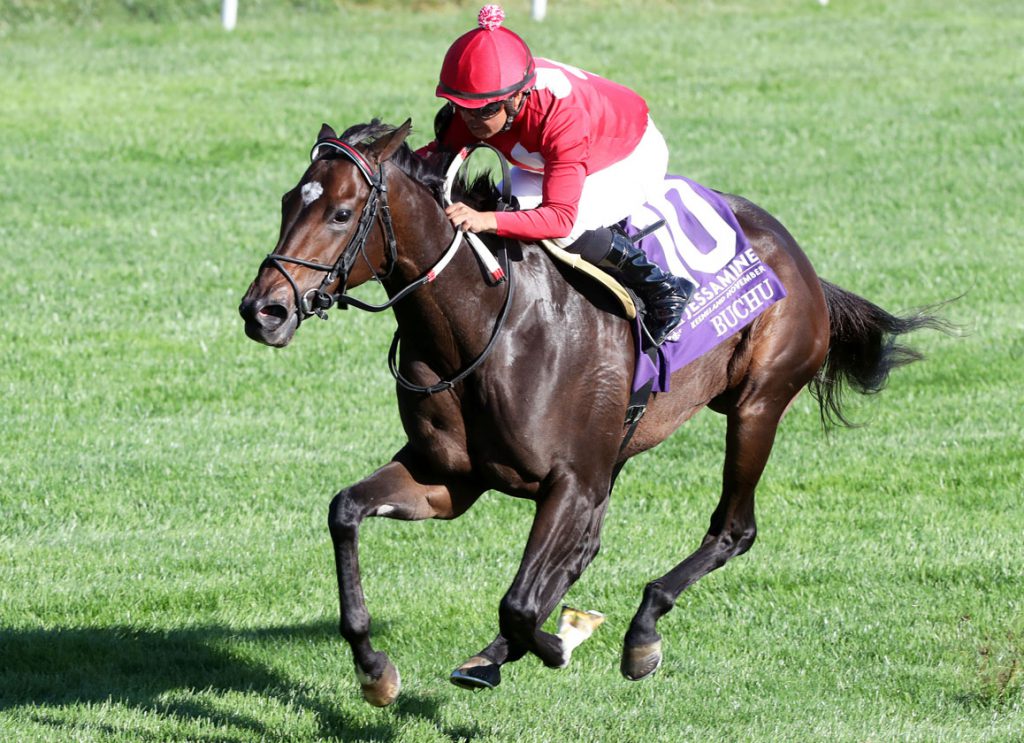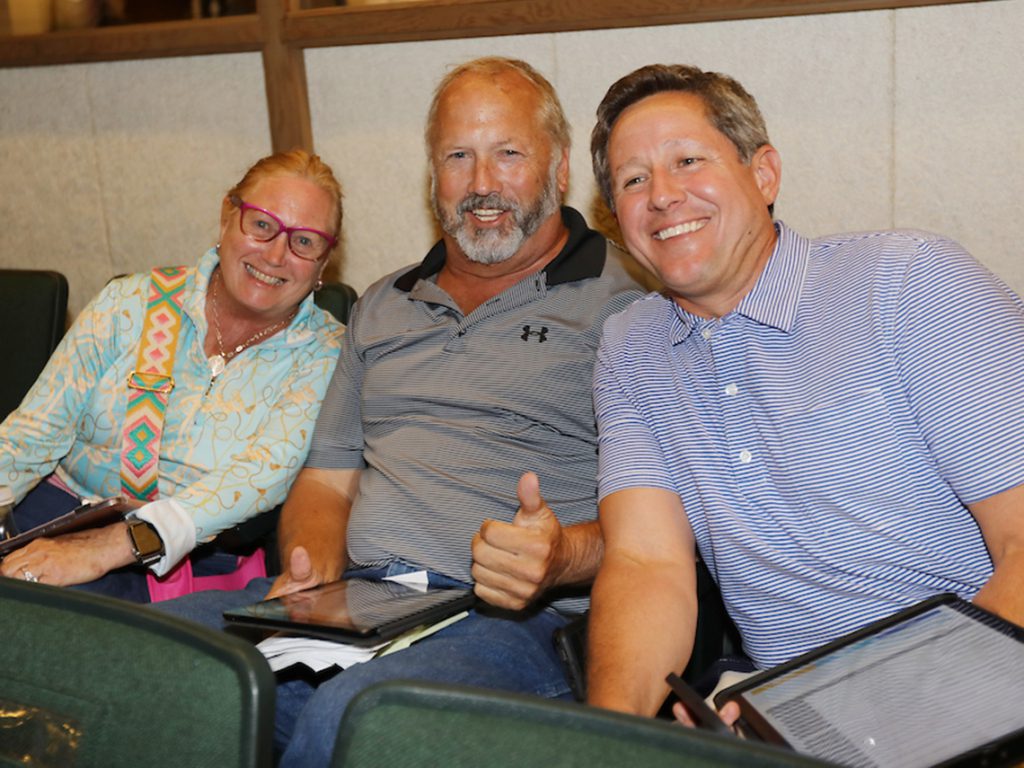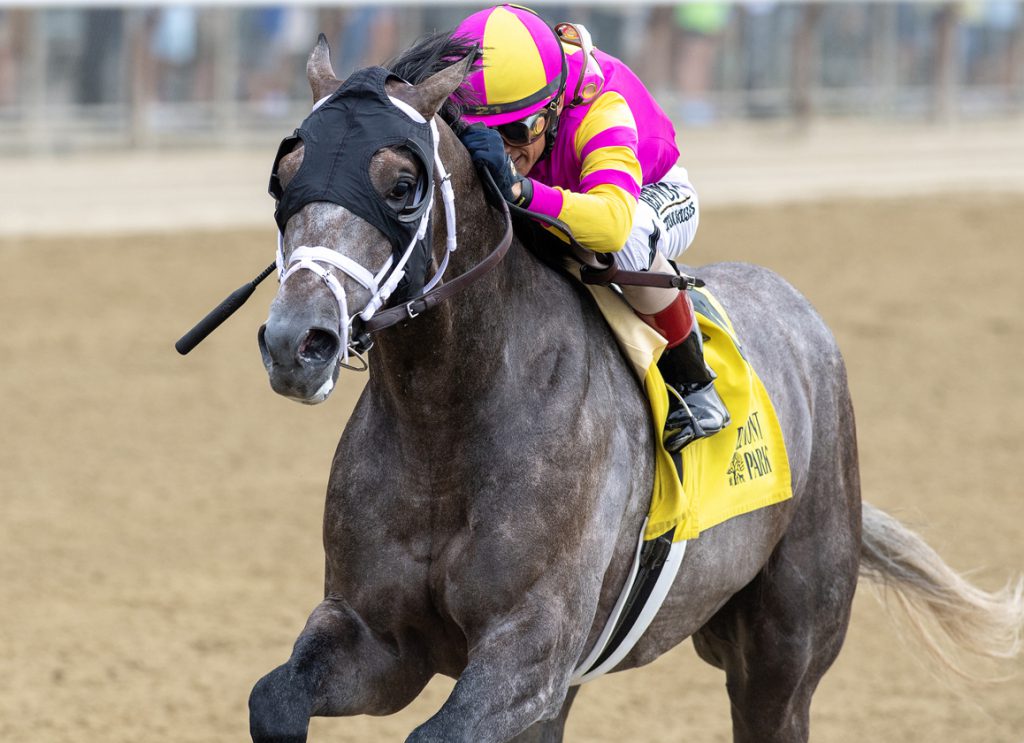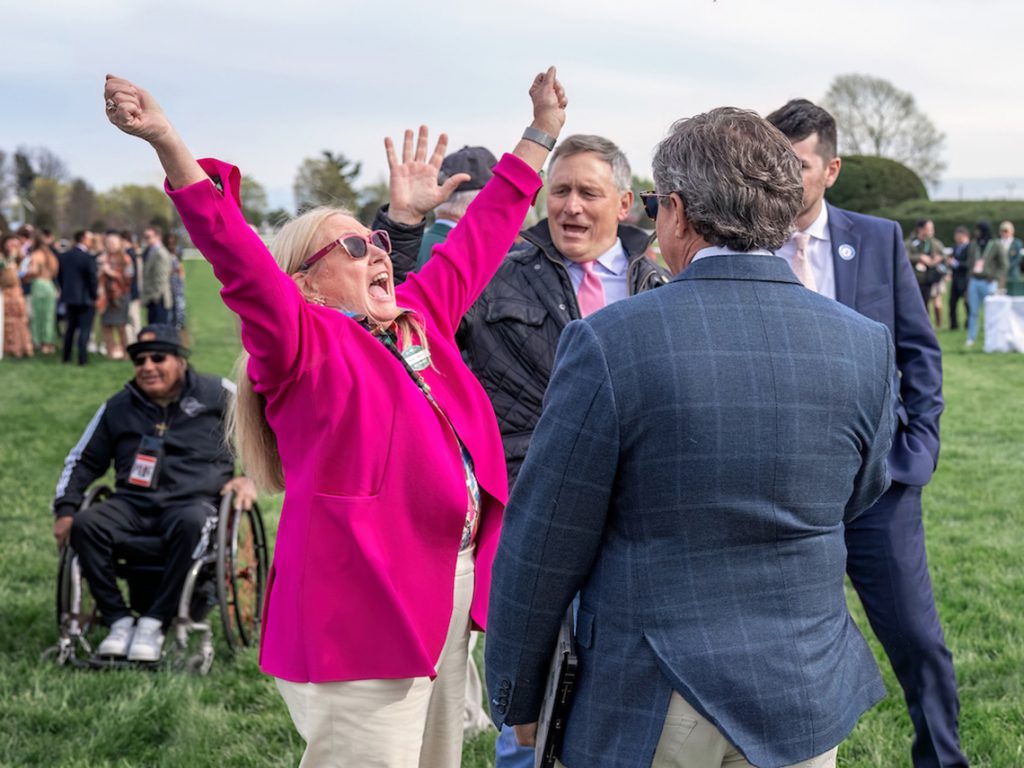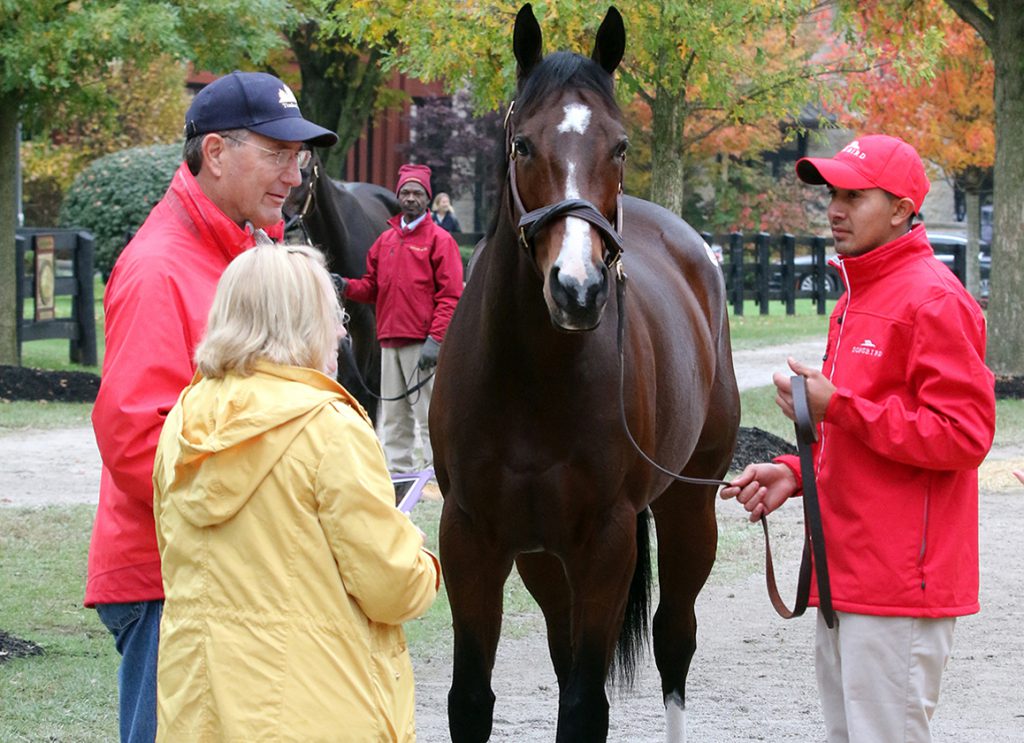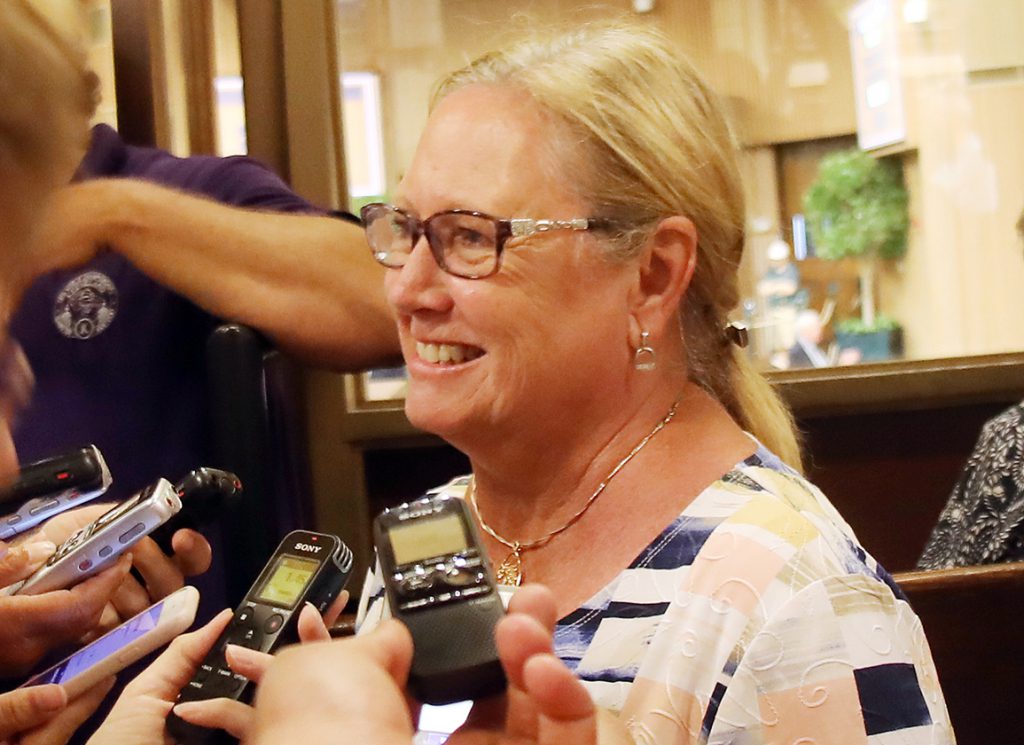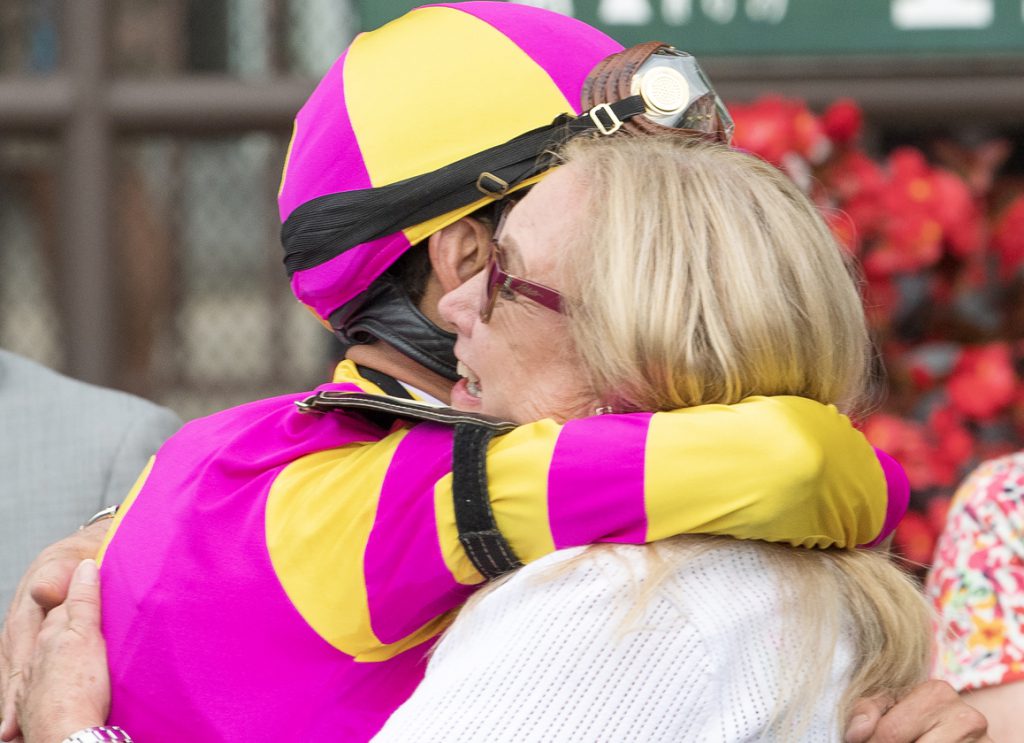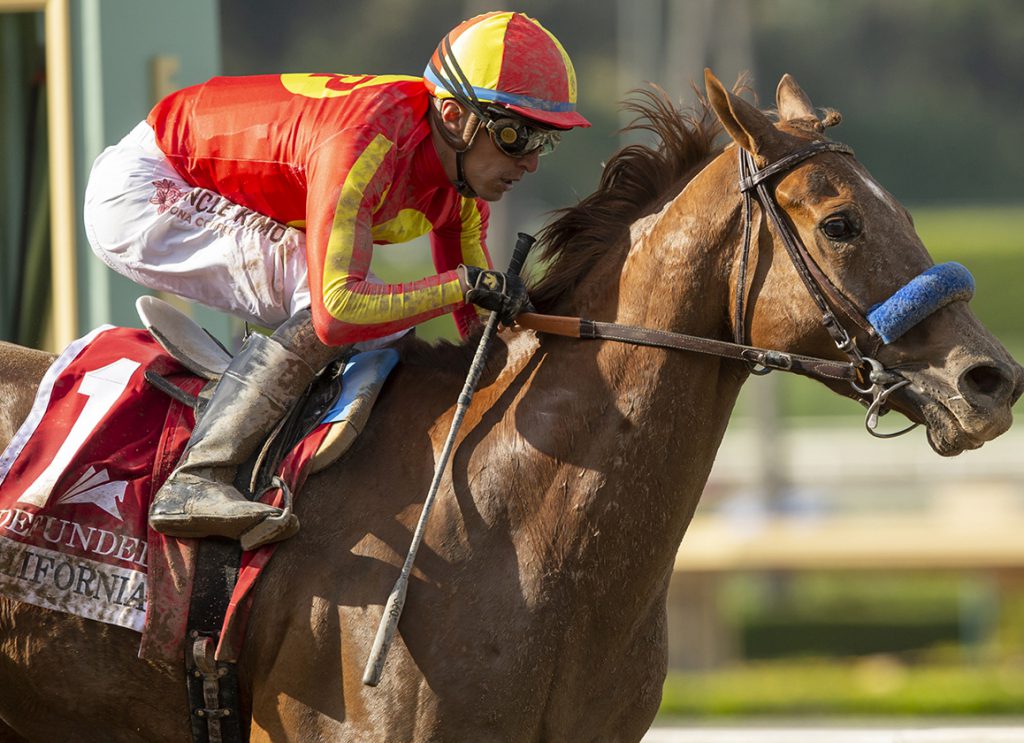Richard Rigney says that nothing in life gives him a bigger kick than his horses. To understand just what that means, it might help to know his idea of a vacation. A few years ago, for instance, he went on a shooting range in Russia. Not that startling, perhaps: this was obviously before the war in Ukraine. It's just the caliber of the ordnance that was a little unusual.
“Shooting a bazooka is so fun,” Rigney says. “My wife Tammy was like, 'You know what? I think it's okay that he shoots the bazooka, but I don't think you should really trust him to drive it.' Because I'm a really bad driver!”
He finds a picture on his phone.
“Here's me going into the tank,” he says. “It was from World War II. I blew up a car, like, half a mile away. So that was a thing. We do a lot of traveling, and we love safaris. I guess that was kind of one.”
If that's a day on the range, you can imagine what scuba diving in Honolulu might entail.
“So Tammy set it up with these Navy SEALs who do a lot of stuff for Hawaii Five-O,” Rigney says. “So we're doing all these helicopter stunts and then, at the end of it, we're 45 feet above the ocean in our wetsuits and dive into the ocean for a shark dive.”
Sorry, this is for fun?
“This is for fun!” exclaims Rigney. “It's like when we went to Cambodia. She goes, 'I got two things for you to do out there. They're burning down the jungle. So how do you feel about being an anti-poacher, one day, and then putting out fires the next?' For that we had a zipline from the helicopter into the hotel.”
He chuckles, before making the most superfluous statement of 2023: “We're not like normal tourists.”
And that is true in more ways than one. Just ask the Vietnamese jungle guide whose daughter was upset when he made her laugh, because it showed how bad her teeth were. Rigney paid for a dentist to fix those. Then, when Covid hit and the guide had no trade, he also paid her college fees.
So here's a guy whose appetite for life is commensurate with the size of his heart. Rigney talks with infectious relish, a frank grin never far away. But nothing is more instructive of his nature than how that heart deals with a horserace.
In its literal function, it pumps the blood at such a frantic rate that the pulse monitor on his smart-watch goes nuts. “Whenever we're racing, even if it's just a cheap claimer, my watch will say: 'Did you fall down? Do you need help?'” he says. “Because I'm so excited. So yeah, the racing is my favorite of all. And winning a Grade I was the No. 1 most exciting thing in my life, besides having my kids.”
That was when Played Hard, a $280,000 Keeneland September yearling, won the GI La Troienne S. on Derby Day at Churchill. She couldn't be more aptly named, whether for her parentage–by Into Mischief out of Well Lived (Tiznow)–or her owner in the other, more figurative workings of his heart. For this is indeed a life lived on a most generous scale.
Phil Bauer, his trainer, interjects that Rigney didn't even go down to the saddling ring before the race, because he gave all his paddock passes to guests. His finish-line suite at Churchill was supposed to accommodate 40 people, but Rigney brought in extra tables so that he could seat 60. His guests ranged from his kids' ski instructor, to greenkeepers from a golf course he owns in Oklahoma, to his usher at the Tampa Bay Rays.
“All these people are important to me,” Rigney says. “So I had them all come in to experience this race. What a humongous day for me, right?”
And that's key: Rigney makes it sound as though he's doing himself a favor. There's no mistaking the authentic pleasure this man derives from doing things for other people. Even if, like the friend who watched the Churchill race alongside Rigney, the process has its perils.
“I got so excited that I knocked him over!” Rigney admits. “He thought he was going through the window. If you don't know what a rebel yell is, stand next to me during a race.”
There were further such scenes at Keeneland last weekend, when Buchu (Justify) came from last to win the GII Jessamine S. in emphatic style. This was a new frontier, as the filly is homebred, retained at $275,000 at the September Sale last year. She's the first foal of Flowering Peach (Ire), a staying mare by Galileo (Ire) out of a Giant's Causeway half-sister to Medaglia d'Oro. Unsurprisingly, after starting out on dirt, those genes have enabled Buchu to thrive for the switch to grass and she will now be among the leading home contenders for the GI Breeders' Cup Juvenile Fillies Turf.
The sense that Rigney's program is going up a level, after some early struggles, is no coincidence. Played Hard was one of the first recruits made for Rigney by John Moynihan, renowned for his work with Stonestreet and others; while the private acquisition from Coolmore of Flowering Peach, with her sensational pedigree, qualified her as the cornerstone of a relatively new venture: a broodmare band, already up to 16, based at Denali Stud.
“So it's been kind of like a new thing with John,” Rigney explains. “I'm very excited about it. I really want John to be involved in developing the broodmare part. He's the right guy for it, that's obvious. And Played Hard was from the first full crop of yearlings he picked out for us. She was always one we were excited about–from when we were buying her, to when she went into pre-training, John was like, 'This is the horse that might take you to the promised land.'”
Before that, Rigney and Bauer are candid that they were not shopping quite so effectively. But first let's rewind to how this whole thing started; how Rigney was first drawn to the color and excitement of the sport, as a young man privileged to grow up in buzzing Pasadena, California. (His father was an engineer who worked on the B1 bomber and Apollo spacecraft; while his mother was an accountant.)
Rigney paid his way through college by his wagering at Santa Anita and Hollywood Park–which instinct, incidentally, has never left him. In 2014, having never played a hand in his life, Rigney accompanied a buddy to Las Vegas for the World Series of Poker. He thought he might as well pay the $10,000 fee and, from a field of 6,683, was famously ranking as high as 86th when losing out, on the fourth day, on a pile of chips that exceeded more than $800,000. Some of his rookie moves had baffled the professionals and Rigney, to disguise his ignorance, had maintained a silence so resolutely enigmatic that many assumed he couldn't even speak English.
But all this freewheeling through life–all these exotic exploits, all his munificence–is actually founded on lab coats and precision.
Rigney owns Clarendon Flavors, a manufacturer of extracts for the beverage industry. “It was just a very fortunate thing,” he protests. “I'm not the smartest guy in the world, but it was the right place, right time. I was working on my master's degree and looking for a job close by. And the nearest one to my school was in this little company, a flavor house. I didn't even know what that meant. But it said they needed a chemist, so I went to interview.”
So began his education in the intricate palette of ingredients from which flavor is designed.
“It's like painting,” he says. “It's a really bizarre industry: part chemistry, part art. And the longer you do it, the more of an artist you need to be. I don't really see myself as a chemist really anymore. It's just being a creative person.”
All flavor can apparently be broken down into basic constituents. “Banana, for example, has a hundred different components–but the No. 1 is isoamyl acetate,” Rigney explains. “And that's something you can synthesize from natural ingredients.”
In 1996, after a takeover of the holding group, the opportunity arose for Rigney to finance a buyout of the company he was working for. Three years later he had paid off the loan, and growth since has been perennial. He has clients around the world and across the spectrum: at least half in distilled spirits, but also others making soda pop, apple sauce, ice cream, baby food. Though his company's input usually comprises no more than 0.5-1.0 percent of the finished product, it will go out in 6,000-gallon tankers from two factories in Kentucky, at Louisville and Owensboro.
Things were soon going well enough that Tammy bought her husband a share in a racehorse: a Bernstein filly found by Kenny McPeek for $60,000 at the 2007 September Sale. In the silks of the Livin The Dream partnership, Dream Empress broke her maiden at Saratoga and then won the GI Alcibiades S. by four lengths before running second at the Breeders' Cup.
Not only was Rigney now hooked. He had also hit it off with Bauer, then working for McPeek. In fact, Bauer was the filly's groom at Saratoga before being made McPeek's assistant, even as Rigney started buying a few horses in his own right. The very next season Rigney was back in the Keeneland winner's circle after another juvenile Grade I, and Breeders' Futurity winner Noble's Promise (Cuvee) then went on to run fifth in the GI Kentucky Derby.
Eventually Rigney told Bauer that he would like to take his involvement to another level.
“He originally asked me how many horses it would take for me to go out on my own,” recalls Bauer. “I was unsure of a number. So then he said, 'Well, what about a private job? Just you and me?' And I said, 'I'm ready to go today.'”
“And we did terribly,” declares Rigney with a laugh. “So then I'm getting phone calls from all these different trainers, like, 'Hey, why don't you drop Phil?' And I was like, 'If I'm not with Philip, I'm not going to be in this game.' People didn't really quite understand, at first, but after a couple of years people stopped calling me. Because it's us doing this together. I get to be part of this process, I get to do the day-to-day. We talk all the time. We're like a married couple. We're always together, and we always support each other.”
And now, with the stock upgraded by Moynihan, it's all coming together. In 2023, Bauer has saddled 21 winners from just 89 starters–doubling his strike-rate from just two years ago. There are green shoots everywhere. A couple of weeks ago Twirling Good Time (Twirling Candy), a $250,000 Keeneland September yearling, was named a 'TDN Rising Star' for her stylish debut in a sprint maiden at Churchill Downs. Just three days previously Gorilla Trek (Curlin), homebred with Denali and Valli Rose Equine, also opened his account in Louisville; while only a day before that, Buchu herself had broken her maiden on a card that also featured a second stakes success, by six lengths, for the sophomore Xigera (Nyquist). That performance earned Xigera a 97 Beyer, one of the three fastest of the year among 3-year-old fillies, and helped Rigney racing to a share of the owner's title at the September meet.
“I knew Phil was a good trainer from the very beginning,” Rigney says proudly. “It's the way he takes care of horses. But it's also about the way we take care of people. The people at the barn are very important to us. We hire the best that we possibly can, and treat them the best we possibly can. So what's happening now, these are the most fun times.
“Some of these horses we get so close to, it all becomes very personal. Like a family experience. I have to worry about Philip a lot more than he has to worry about me! He gets all upset if a horse runs like Xigera did at the Breeders' Cup last year. I was like, 'It's okay, it's okay.' Most owners don't have to deal with this! But if things don't work out, we never look back.”
No need to do that, anyhow, with so much to look forward to.
“There's been an overall feeling, the last three years, that you could feel it coming,” Bauer agrees. “Just when you get introduced to the new ones coming in, when you breeze the horses, there's just so much more quality. It's such a difference. These horses are extremely talented athletes. A lot of times, you just have to keep out of their way.”
And, given how much their patron loves action, the program's evolution since Moynihan came aboard makes a lot of sense. With so much more quality now, plus a breeding division, there's seldom a dull moment. When they go to the sales these days, for instance, Rigney will be selling as well as buying. Buchu's dam Flowering Peach–aptly enough, Buchu is the flavoring agent for peach–already looks an extremely commercial proposition. She had an Uncle Mo filly this spring and is now in foal to Golden Pal.
Best of all, these episodic excitements all aggregate to something bigger. “The thing is that we're looking at it really long term,” Rigney emphasizes. “Even in our bad years, we've done better each year, and that was what I wanted. You do get used to being knocked down in this game, and that doesn't really bother me. It's a tough sport. There's a lot of people here who want to win just as badly as we do. And so I'm okay with that. But when we do win a big race, then it's just huge. We're so excited.”
The post Keeneland Breeder Spotlight: Rigney Savoring Sweet Flavor of Success appeared first on TDN | Thoroughbred Daily News | Horse Racing News, Results and Video | Thoroughbred Breeding and Auctions.


